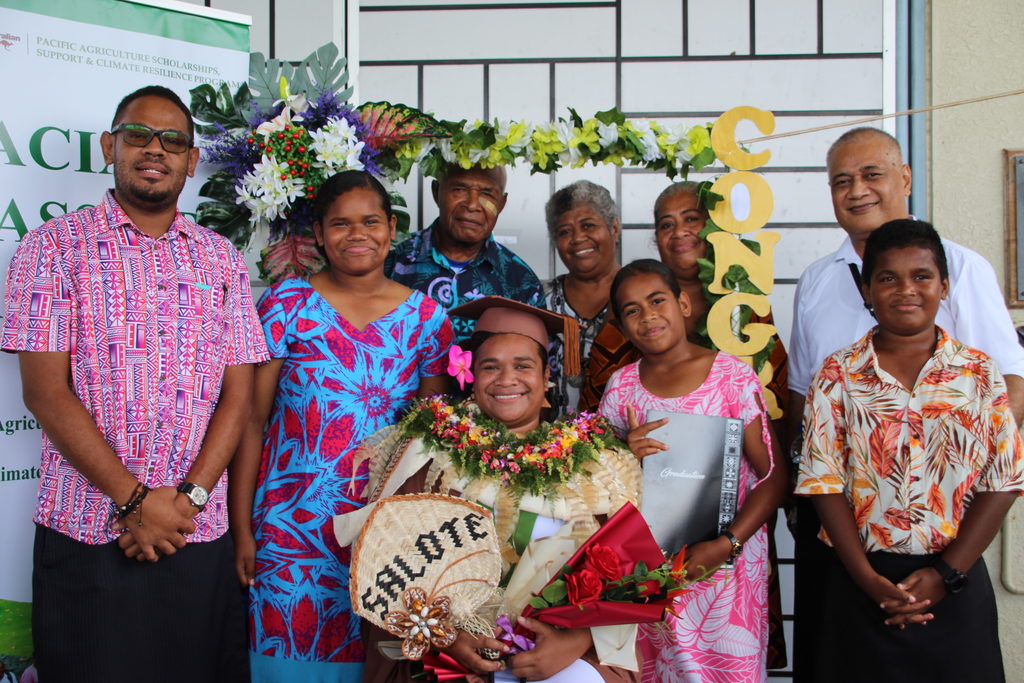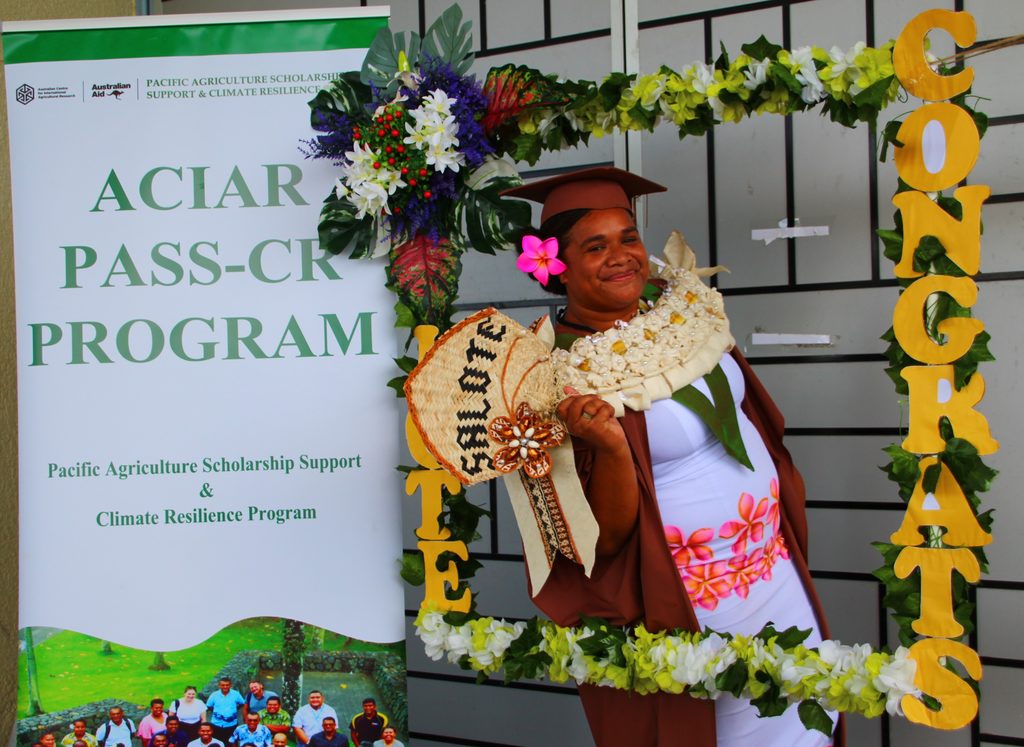When Salote Sevuti Nasalo opened her email one early December morning in 2020, she was not expecting life-changing news. But there it was: a single line from an email that would bring her to tears.
“Congratulations Ms. Salote Nasalo…”
“That was it,” she recalled. “The rest was a blur. I jumped, screamed, probably awoken the whole neighbourhood and I cried for hours,” she said with a laugh.
Ms Nasalo had just been awarded the ACIAR Pacific Agriculture Scholarship Support (PASS) program to pursue a Master of Science in Climate Change at the University of the South Pacific.
Supported by the Australian Centre for International Agricultural Research (ACIAR) the PASS program provides a full scholarship for many Pacific islanders wishing to pursue post graduate studies in fisheries, agriculture, and forestry at the University of the South Pacific and Fiji National University.
Since its inception in 2007, more than 100 Pacific Islanders have attained master or PhD degrees in these fields with most now holding senior positions in their respective government agencies, organisations and universities.
For the bubbly Ms Nasalo, who hails from Bukuya, Ba with maternal links to Namuka-i-Lau, the Masters scholarship was an answered prayer, a door she had been knocking on for a while.
The long road to graduation
“It took me ten years to complete my degree. I dropped out of university. Lost my FAB (Fijian Affairs Board) scholarship, had a beautiful baby, and worked dead-end jobs to scrape by. There were moments I wanted to give up,” she said.
“But I held onto my dream.”
So, when Ms Nasalo graduated with her degree in December 2017, it was fulfilling a promise made to her father.
“My dad used to tell me, ‘Luvequ, au vinakata mo imatai ni gone ena nodatou mataqali mo rawata na nomu koroi.’ (‘My daughter, I want you to be the first in our tribe to attain a degree.’)
“When I graduated, I felt like I had conquered the world, and I told myself ‘I will not stop at a degree. I will do my postgrad, my Masters, my PhD’.”
Growing up, as soon as Ms Nasalo heard the word scientist, her mind immediately thought of the “palagi” spaceships and travelling to the moon because that was what she watched on television.
“I think of extremely smart individuals, brilliant, but never in a million years did I think that I would become one. A daughter of a minibus driver whose mom has never worked in her life and brought up in one of Lautoka city’s biggest informal settlements, Tomuka.
“Although I was fortunate to have the steadfast support of my family, the dream remained well beyond my reach until that email from ACIAR, becoming the first PaCE-SD (Pacific Centre for Environment and Sustainable Development) graduate student to be awarded an ACIAR scholarship.”
The mangrove connection
Through the ACIAR scholarship Ms Nasalo pursued a Master of Science in Climate Change at the University of the South Pacific. Her research focussed on the restoration, management, monitoring, and evaluation of mangrove ecosystems, with her fieldwork based in the Suva areas of Lami and Nasese.
“My research compared naturally occurring mangrove systems with those established through human intervention. These human-influenced systems refer to mangroves planted through initiatives led by international NGOs, local NGOs, civil society groups, and government agencies. Specifically, looking at sites restored by the PaCE-SD Graduate Students Association in Lami and Nasese.”
She noted that part of her work involves identifying ways to enhance the effectiveness of these planting efforts at the grassroots level by analysing the natural regeneration patterns at each site.
She emphasised that mangroves are delicate and require ongoing care and protection to thrive after planting.
“My goal is to design a monitoring and evaluation tool that can assess the success of both natural and human-assisted mangrove systems.”
Although she described her research as straightforward, she believes its implications are significant for coastal communities throughout Fiji and the wider Pacific.
“Mangroves play a crucial role, particularly for those living along the coast. Personally, I’ve seen the value they bring — my grandmother used to collect crabs from the mangroves and sell them to support our family.
“Choosing mangroves as my area of study is one way of acknowledging my grandaunt Pu Sera for all she did and sacrificed while bringing us up.
“This year she will turn 93, and I am so grateful that she gets to see my work on mangroves and celebrate my accomplishments.”
Ms Nasalo finally attained her Masters after graduating from the University of the South Pacific in January of this year. The following month, in February, she was awarded a PhD scholarship under Project Halophyte — a joint program between USP and University of New South Wales (UNSW). Still studying mangroves. Still holding the line for her people.
Reflecting on her journey, Ms Nasalo describes the ACIAR PASS program as more than a scholarship.
“It is a family. The opportunities are incredible from national presentations to international forums. They have not only funded a thesis, they have changed a life.”
Ms Nasalo also hopes her work will help strengthen support for coastal livelihoods.
“I still see people relying on the sea—gathering crabs, seashells, and other marine resources for daily sustenance. Mangroves are key to maintaining these ecosystems that sustain families.
“If I can provide practical recommendations or develop a tool that allows stakeholders to track mangrove growth, it could make a meaningful difference—ensuring survival of the mangroves and delivering long-term benefits to communities locally and globally.”
n Matilda Simmons is the communications person for the Australian Centre for International Agricultural Research Pacific office based in Suva.
Salote Nasalo with her family after graduating with her Masters in Climate Change from the University of the South Pacific. Picture: SUPPLIED

PHOTO 3 Not only did she completed her degree and masters Salote is now on a journey to complete her PhD. Picture: SUPPLIED


